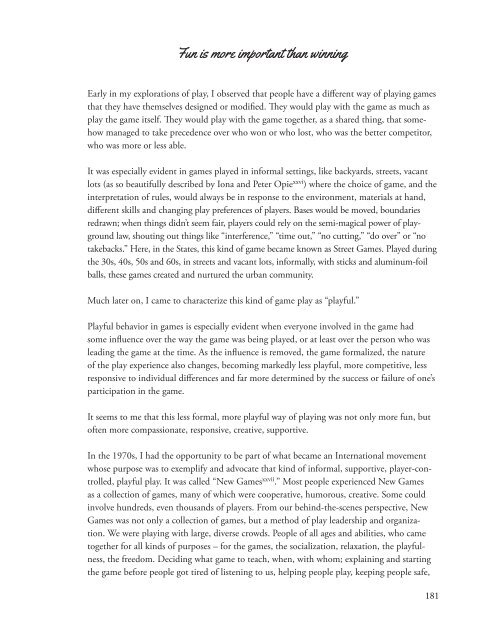A-Playful-Path_DeKoven-web
A-Playful-Path_DeKoven-web
A-Playful-Path_DeKoven-web
You also want an ePaper? Increase the reach of your titles
YUMPU automatically turns print PDFs into web optimized ePapers that Google loves.
Fun is more important than winning<br />
Early in my explorations of play, I observed that people have a different way of playing games<br />
that they have themselves designed or modified. They would play with the game as much as<br />
play the game itself. They would play with the game together, as a shared thing, that somehow<br />
managed to take precedence over who won or who lost, who was the better competitor,<br />
who was more or less able.<br />
It was especially evident in games played in informal settings, like backyards, streets, vacant<br />
lots (as so beautifully described by Iona and Peter Opie xxvi ) where the choice of game, and the<br />
interpretation of rules, would always be in response to the environment, materials at hand,<br />
different skills and changing play preferences of players. Bases would be moved, boundaries<br />
redrawn; when things didn’t seem fair, players could rely on the semi-magical power of playground<br />
law, shouting out things like “interference,” “time out,” “no cutting,” “do over” or “no<br />
takebacks.” Here, in the States, this kind of game became known as Street Games. Played during<br />
the 30s, 40s, 50s and 60s, in streets and vacant lots, informally, with sticks and aluminum-foil<br />
balls, these games created and nurtured the urban community.<br />
Much later on, I came to characterize this kind of game play as “playful.”<br />
<strong>Playful</strong> behavior in games is especially evident when everyone involved in the game had<br />
some influence over the way the game was being played, or at least over the person who was<br />
leading the game at the time. As the influence is removed, the game formalized, the nature<br />
of the play experience also changes, becoming markedly less playful, more competitive, less<br />
responsive to individual differences and far more determined by the success or failure of one’s<br />
participation in the game.<br />
It seems to me that this less formal, more playful way of playing was not only more fun, but<br />
often more compassionate, responsive, creative, supportive.<br />
In the 1970s, I had the opportunity to be part of what became an International movement<br />
whose purpose was to exemplify and advocate that kind of informal, supportive, player-controlled,<br />
playful play. It was called “New Games xxvii .” Most people experienced New Games<br />
as a collection of games, many of which were cooperative, humorous, creative. Some could<br />
involve hundreds, even thousands of players. From our behind-the-scenes perspective, New<br />
Games was not only a collection of games, but a method of play leadership and organization.<br />
We were playing with large, diverse crowds. People of all ages and abilities, who came<br />
together for all kinds of purposes – for the games, the socialization, relaxation, the playfulness,<br />
the freedom. Deciding what game to teach, when, with whom; explaining and starting<br />
the game before people got tired of listening to us, helping people play, keeping people safe,<br />
181


